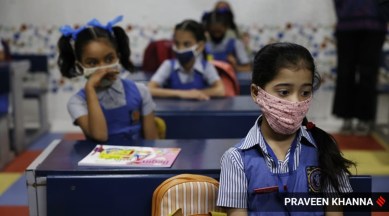Stay updated with the latest - Click here to follow us on Instagram
Delhi: Schools, colleges, shut due to pollution, to reopen on Monday
Delhi schools to reopen: Government offices, which were on work-from-home mode, will also open up from November 29 onwards, Rai said.

Schools, colleges, institutes and libraries that were closed due to poor air quality will reopen from November 29, Environment Minister Gopal Rai said Wednesday.
Amid the rising pollution levels in the capital, Chief Minister Arvind Kejriwal on November 13 had announced that schools would remain closed for in-person classes, while online classes will continue.
Government offices, which were on work-from-home mode, will also open up from November 29, Rai said. Government employees have been advised to use public transport as much as possible.
Entry of trucks, apart from those carrying essentials, has been banned. Only CNG and electric trucks carrying non-essential services will be allowed entry into Delhi from November 27 to December 3, Rai said.
Rai was speaking after a meeting with government officials Wednesday.
Some of the private CNG buses that have been hired to augment public transport will be deployed in areas where the Delhi government employees live, like Timarpur and Gulabi Bagh, he said.
Shuttle buses will be deployed from metro stations close to the Delhi Secretariat to facilitate the transport of employees.
A senior official of the Transport Department said that nearly 700 hired CNG buses have been issued permits and are plying.
Meanwhile, the air quality index in Delhi Wednesday was 361 — in the ‘very poor’ category– according to the Central Pollution Control Board bulletin. The AQI has deteriorated from 290 on Tuesday.
A forecast from the SAFAR system said that local surface winds have been low, resulting in the deterioration in air quality. Winds are likely to be low for the next three days as well, making the dispersion of pollutants difficult. For the next two days, the air quality is likely to remain in the upper end of the ‘very poor’ category, said the forecast issued Wednesday.
The fire count from stubble burning was 432, according to the SAFAR system, and its contribution to PM2.5 levels in Delhi was 2% Wednesday. “With the onset of winter, local weather is likely to be dominating in determining air quality,” the forecast read.
At some monitoring stations, the AQI as a 24-hour average returned to the ‘severe’ category. At the Anand Vihar monitoring station, for instance, the AQI as a 24-hour average at 7 pm was 432, in the ‘severe’ category.
AQI between 401 and 500 is categorised as ‘severe.’ At the same time,
Jahangirpuri recorded an AQI of 457, Mundka recorded 401, Wazirpur registered an AQI of 422, and Sonia Vihar 420.